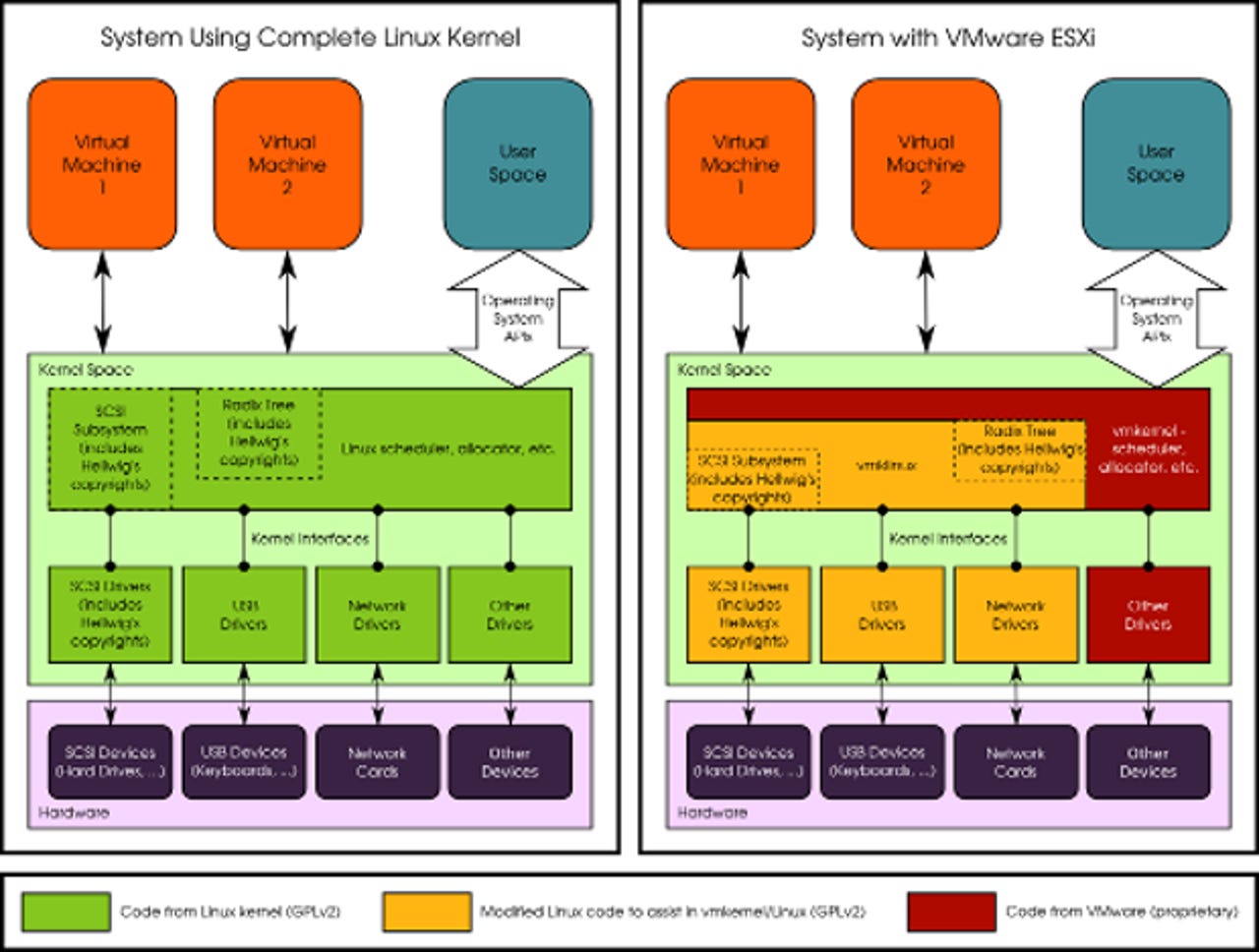VMware sued for failure to comply with Linux license

In 2007, top Linux contributor Christoph Hellwig accused VMware of using Linux as the basis for the VMware ESX bare-metal hypervisor, an essential part of VMware's cloud offerings.
Years went by and the Software Freedom Conservancy, a non-profit organization that promotes open-source software, claims to have negotiated with VMware for the company to release ESX's code, and its successor ESXi. That way, argued the Software Freedom Conservancy, these programs would legally comply with Linux's Gnu General Public License version 2 (GPLv2). VMware refused in 2014.
Now, Hellweg and the Software Freedom Conservancy are suing VMware in the district court of Hamburg in Hamburg, Germany.

What's surprising about VMware's stubbornness is that there's never been much question that VMware had used Linux in ESX and ESXi. As Hellwig wrote in 2007, "VMware uses a badly hacked 2.4 kernel with a big binary blob hooked into it, giving a derived work of the Linux kernel that's not legally redistributable."
On top of that, in 2011, the Conservancy said that VMware failed to provide nor offer any source code for the version of BusyBox, a popular embedded Linux distribution and toolkit, in ESXi. Historically, BusyBox's developers have been aggressive about defending the GPLv2. During 2007, BusyBox successfully concluded the first US GPL-related lawsuit. The developers then followed up with victories against Verizon and other would-be GPLv2 violators.
Despite the evidence of the code, the Conservancy stated, "VMware's legal counsel finally informed Conservancy in 2014 that VMware had no intention of ceasing their distribution of proprietary-licensed works derived from Hellwig's and other kernel developers' copyrights, despite the terms of GPLv2." Therefore, the Conservancy felt it had "no recourse but to support Hellwig's court action."
Besides the general violation of the license, the group continued, "Conservancy and Hellwig specifically assert that VMware has combined copyrighted Linux code, licensed under GPLv2, with their own proprietary code called "vmkernel" and distributed the entire combined work without providing nor offering complete, corresponding source code for that combined work under terms of the GPLv2."
Both Hellwig and the Conservancy state in a FAQ on the lawsuit that "Simply put, Conservancy and Christoph fully exhausted every possible non-litigation strategy and tactic to convince VMware to do the right thing before filing this litigation."
TechRepublic
Commenting generally on the issue of GPL enforcement, Bradley M. Kuhn, the Conservancy's President and Distinguished Technologist, said in a statement that "The prevalence and sheer volume of GPL violations has increased by many orders of magnitude in the nearly two decades that I have worked on enforcement of the GPL. We must make a stand to show that individual developers and software freedom enthusiasts wish to uphold copyleft as a good strategy to achieve more access to source code and the right to modify, improve and share that source code. I ask that everyone support Conservancy in this action"
The Free Software Foundation (FSF), an organization that defends the legal rights of open-source software developers and users , also supports Hellwig. The FSF Executive Director, John Sullivan said, "I know that they (the Conservancy) have been completely reasonable in their expectations with VMware and have taken all appropriate steps to address this failure before resorting to the courts. Their motivation is to stand up for the rights of computer users and developers worldwide, the very same rights VMware has enjoyed as a distributor of GPL-covered software. The point of the GPL is that nobody can claim those rights and then kick away the ladder to prevent others from also receiving them. We hope VMware will step up and do the right thing."
VMware's Director of Corporate Public Relations, Michael Thacker, replied, "We believe the lawsuit is without merit. VMware embraces, participates in, and is committed to the open-source community. We believe we will prevail on all issues through the judicial process in Germany."
Related Stories:
- The fall of GPL and the rise of permissive open-source licenses
- Decisions, decisions. How do you choose an open source license?
- Microsoft to open source more of .NET, and bring it to Linux, Mac OS X
- Should APIs be copyrighted?
- Microsoft admits its GPL violation; will reissue Windows 7 tool under open-source license